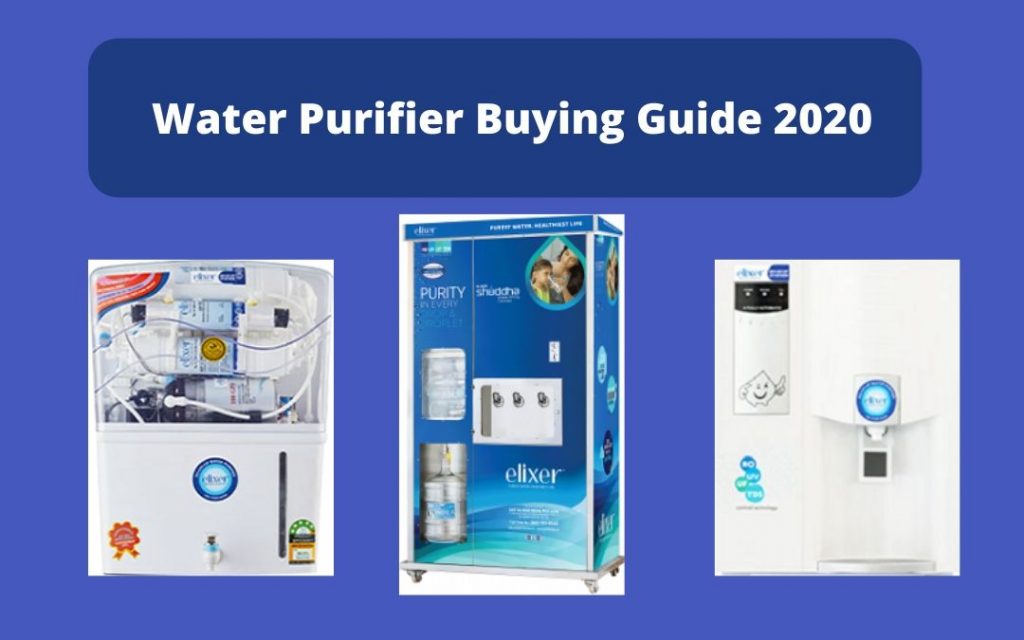Water Purifier Buying Guide 2020
Water purifiers are essential for ensuring the purity of drinking water and protecting your health, be it at your home or commercial establishment. A good water purifier can keep you safe from dangerous waterborne diseases. In this water purifier buying guide for 2020, we are going to look at how you can make the best decision while purchasing a water purifier. We are going to answer all the question that you might have so that you can make an informed decision.
How Does Water Get Contaminated?
To understand how water gets contaminated and why you need to purify it, you must first understand the concept of Totally Dissolved Solids or TDS. The main contamination in your water supply comes from salts and minerals that the river water soaks up as it flows down from its source towards the sea. Potassium, sodium, chlorine, and magnesium and some phosphates and nitrates all get dissolved in the water making up the TDS.
Apart from the TDS, water also gets contaminated by pollution from sewage or from industrial wasters like arsenic, lead, iron, and mercury. These wastes can get mixed in with the water supply and cause diseases.
While it is essential that most contaminants need to be removed from drinking water, you must also ensure that you do not remove all the mineral from it at the same time — the body needs a certain level of minerals for healthy functioning.
What is the acceptable level of TDS?
Here are the different levels of TDS in water and what they mean. All measures are mentioned in parts per million (ppm):
- Less than 300 – best quality drinking water
- Between 300 to 600 – safe for human consumption
- Between 600 to 900 – acceptable levels of TDS
- Between 900 to 1200 – poor levels of TDS
- Above 1200 – water is unfit for drinking
Most of the water supplied by the municipality has already undergone a level of treatment and has TDS levels below 300 ppm. Groundwater usually has high levels of TDS — could be up to up to 2000 ppm.
Of course, TDS is not the only factor to consider. You could get water with TDS below 300 ppm that has a high concentration of arsenic which is dangerous for you. That is why it is essential to have a good purifier to clean up your drinking water before consumption.
Types of Water Purifiers
Broadly speaking, there are 4 types of water purifiers:
- Membrane filter-based purifier
The simplest version of the membrane filter-based purifier simply involves using pieces of cloth to trap dirt and suspended particles in the water. More advanced versions use a high-density wire mesh to trap the contaminants. This type of filter is best used in places where you know that water pollution is less.
- Gravity-based water purifiers
As the name suggests, this type of filter uses gravity to purify water. The filters available in the market today comprise of two tanks — one placed on top where you put in the water and the other that collects and stores the filtered water. The filter needs to be replaced once in a while. This type of filter works best in places where there are low levels of TDS in the water.
- Reverse Osmosis+UV+UF water filters
These are the most common water filters. The technique of Reverse Osmosis is one of the most effective for water purification and eliminates up to 90% of the TDS. They can remove pesticides, heavy metals, bacteria and viruses. The RO filters normally also have an UltraViolet compartment and an UltraFilter membrane. You can also get standalone UV water purifiers.
- Electro Adsorption Technology (EAT)
Electro Adsorption Technology (EAT) gives you the same quality of water as the RO process and it does so without wasting water. The only drawback is that it works best when the water to be purified has a TDS content of less than 500.
Water Purifier Buying Guide
Now that you understand the types of impurities in water, why its necessary to filter water and what the different types of water purifier are, we can look at some guidelines that will help you make the best decision while purchasing your next water purifier.
You can start by conducting a TDS test. If you are getting your water supply from a source the is guaranteed to be pure — for instance, water in the mountains that’s melted from the snowcaps, you can be sure that it doesn’t contain much TDS and you can drink it directly.
In almost all other cases, you need to use some kind of filter. If you find that there is some degree of contamination, but not very much, then you can go with a gravity-based water filter. But to be totally safe, it’s best to choose an RO based water purifier. If you live in an urban area and there are industrial units nearby, then you can be sure that there is some degree of contamination happening. So it is best to go for an RO water purifier.
Although RO water purifiers are the safest option, they are also expensive. They require regular maintenance as well. Also, the average RO purifier wastes approximately 3 litres of water for every 1 litre of purified water — only 25% of water is purified and 75% of water is wasted. These are factors that you might want to consider before you make a purchase.
The Types Of RO Water Purifiers
Depending on where they are being used, RO water purifiers can be classified as follows:
- Commercial: these water purifiers are perfect for factories and industries that have employees who need clean drinking water.
- Institutional: these types of water purifiers are suitable for schools, colleges, hospitals, restaurants, religious institutions and so on.
- Filling counters: these counters are places like railway stations, bus stands, and other public places where people need to fill up.
- Domestic water purifiers: these are perfect for families of any size so that they have access to clean drinking water at home.
Conclusion
To wrap it up, if you are looking for a water purifier for your home or commercial establishment, then you cannot go wrong by choosing an RO water purifier. They give you the best guarantee of safe drinking water compared to any other type of purifier. Of course, the type of water purifier you choose will have to be based on the number of people who will need safe and clean drinking water and the amount of water needed.
We hope that this water purifier buying guide has been helpful for you. With SKF water purifiers, you get the best quality of purified water through the RO process. With the wide variety of options available from SKF, there is a water purifier for every place. Learn more about the best water purifiers here.



Recent Comments